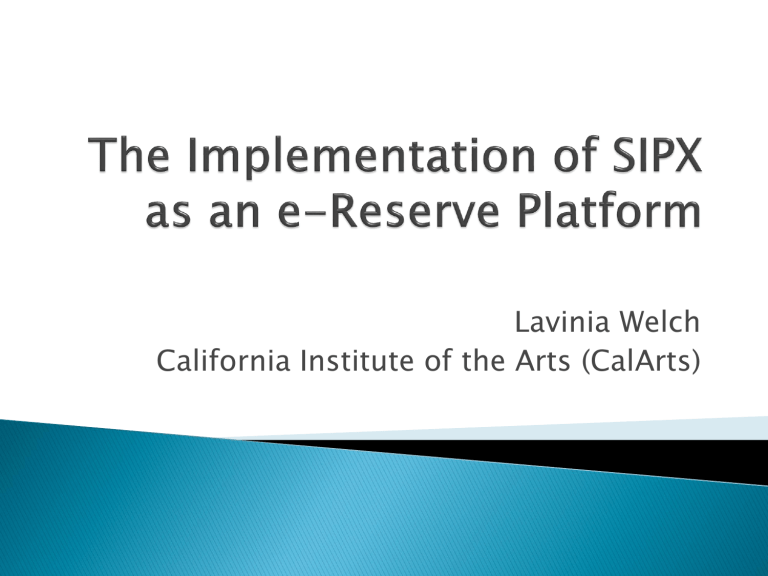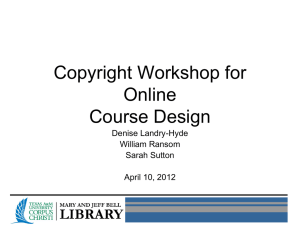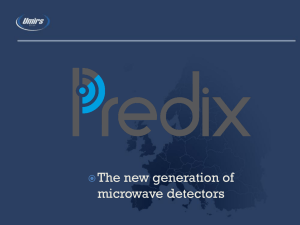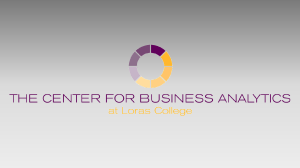The implementation of SIPX as an e-Reserve

Lavinia Welch
California Institute of the Arts (CalArts)
What are we going to talk about?
• The CalArts culture
• Why e-Reserve
• Decisions, decisions…
• Discovery
• Set-up steps
• Set-up challenges
• Training
• Campus Implementation
• Conclusions
• What Next?
CalArts Library- Statistics for the Y2012-13
• 1441 Students
• 331 Faculty members
• 171,533 Library holdings
• 938 (65.1%) Undergraduate students
• 491 Graduate students
•1201 Total reserve items
• 50 Total number of University Readers
Why e-Reserves?
•Looking for an e-Reserve solution to act as an alternative to University Readers
• Allowed reevaluation of current copyright compliance of the library and correct utilization of fair use
• Investigated an e-Reserve platform as the institute transitions to a course management system for the first time
• Compared other products on the market such as Copyright Clearance Center
What is SIPX?
• New web-based service developed by Stanford University to simplify the legal use and delivery of digital copyrighted material in higher education
• An e-Reserve platform
•Built on research conducted by the Stanford center for Legal Informatics (CodeX)
( http://www.sipx.com
)
Decision Making Process
• Would SIPX be a good fit for CalArts right now?
• Risk versus return
• Time frame for the implementation with a goal of an immediate pilot fall semester 2013
• Did we have any faculty that would be game to pilot SIPX?
• A “control” with another delivery mechanism for e-Reserves via OpenClass for user comparison
Discovery
• Dean of the Library attends the SCELC ( Statewide California Electronic Library
Consortium ) presentation about the product
• One time fee due for sign up with no additional charges to be one of the first libraries in the product roll out
• No additional charge after the transition to our course management system
• Minimal risk involved – financial and policy wise
• Faculty interest identified
Set-up Steps
• Questionnaire completed for SIPX about holdings and ILS (WMS)
• SIPX requests transfer of holding data from OCLC
• Training session with SIPX team
• Credentials issued to explore platform
Set-up challenges
• Validation issue encountered with different email exchanges
(alum/calarts)
• Solution- provided a comma delimited file with the list of names and email addresses of current CalArts students for validation
• CMS not on board yet at CalArts creating the need for multiple log ins for the SIPX user. SIPX partners with some CMS’s and in doing so the user only logs in on the CMS and is automatically validated on SIPX
• SIPX partners with Moodle, Sakai, Blackboard and has a plug in for Angel
• Future partnerships in the works are Canvas and Moodlerooms
Training
• Online training sessions with SIPX – large team of trainers but seemed fairly new to online training and information was very introductory
• The product is not difficult to use. Any additional questions that we had were answered quickly and effectively
Identifying Test Group
• Critical Studies faculty member agreed to test SIPX with three fall classes
• Critical Studies classes more conducive to SIPX
• Art classes that include visual material use ARTStor for e-Reserves
Campus Implementation
• Set up faculty account and created a class page under faculty name
• Scanned articles and book chapters. It is necessary to have the actual document to upload into SIPX. This is expected to change in the near future with database partnerships in the works (ProQuest, etc.)
• Completed the scanning and upload process for each course
• Emailed the URL to the faculty member who then provided it to students
• Students prompted to set up an account in SIPX the first time they accessed the link
• Reserve materials that CalArts did not own could be purchased via PayPal on
SIPX
• Fees were less than the initial quoted price by SIPX
SIPX Administrator View
SIPX Course Page –Administrator
SIPX Course Page – Student View
Analytics
• Analytics provided on SIPX are unique statistics that CalArts has not had access to in the past
• Details enrollment versus amount spent
• Also details unique users for each item that is purchased
Control Option – OpenClass
• Google Drive was used to create a bibliography for faculty member with hyperlinks embedded that pointed to content that had been uploaded to
Access Services Librarian’s account
• Each hyperlink was set as “share with all that have this link” so that the reserves could be viewed by students using the link
• The URL to the Drive was emailed to the faculty member and the text was copied and pasted into the secure OpenClass page
• Multiple levels of password protection
• Faculty found it easy to navigate
• Students liked that they did not have to create an additional account to access reserves
Conclusions
• Clearance went quickly, much faster then the suggested time frame
• Mixed feelings about the PayPal aspect if course not institutionally funded
• Not a substitute for a course reserve list. Can not list books held by
CalArts that faculty want to add to course reading list. It is electronic content
ONLY for
• The company was very easy to work with and provided ample technical support
• The analytics were impressive. Not sure how that would inform CalArts decision moving forward as we have a small sample of users. A bigger institution would benefit from this feature
• Partnerships with databases promising
What’s Next
• Further user tests needed – final determination planned after the spring
2014 semester
• Do we have faculty interest for continued tests- meeting with Critical Studies faculty in a few weeks to gauge interest
• Is SIPX right for the CalArts community as a unique institution?
• Continuing the tests of other e-Reserve platforms to get a better sense of what works for best us








